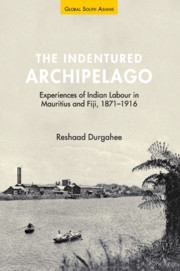Book contents
- Frontmatter
- Dedication
- Contents
- List of Figures and Tables
- Acknowledgements
- List of Abbreviations
- 1 Introduction
- 2 Indentured Spaces: Mauritius
- 3 Indentured Spaces: Fiji
- 4 Subaltern Careering
- 5 Innovation and New Migration Routes
- 6 Conclusion: Space, Agency, Mobility, Geography
- Appendix: Proposed Indian Emigration Routes, 1871–1914
- Glossary
- Bibliography
- Index
6 - Conclusion: Space, Agency, Mobility, Geography
Published online by Cambridge University Press: 06 August 2021
- Frontmatter
- Dedication
- Contents
- List of Figures and Tables
- Acknowledgements
- List of Abbreviations
- 1 Introduction
- 2 Indentured Spaces: Mauritius
- 3 Indentured Spaces: Fiji
- 4 Subaltern Careering
- 5 Innovation and New Migration Routes
- 6 Conclusion: Space, Agency, Mobility, Geography
- Appendix: Proposed Indian Emigration Routes, 1871–1914
- Glossary
- Bibliography
- Index
Summary
A geographical analysis of indenture can enable vital new understandings not only of the system but also of the broader imperial geographies of the post-slavery world. Indian indenture was global. It was a trans-oceanic phenomenon drawing actors together from different parts of the globe. These actors were elite, middle class and subaltern. They were male, they were female; adults and children; human and non-human. To appreciate the scale of the system and the connectivity between the colonies which recruited Indian indentured labour, the geographical term archipelago is used. Contextualising the experiences of indenture in Mauritius and Fiji within the indentured archipelago ensures that the connectivity of these colonial spaces which were bound together by the cord of indenture is not severed.
In focusing on Mauritius and Fiji, experiences of indenture within colonialism are brought to light, re-approaching the indentured labourer experience from below. Considering space within the Indian indenture story enables us to draw attention to particular aspects of the system. The indentured experience has so often been viewed in siloed studies of individual colonies even though indenture in one particular colony drew connections with other parts of the indentured archipelago. Given the methodological nationalism of colonial historiography, these connections have remained relatively unexplored. They should no longer remain so.
As this book illustrates, the teasing out of connections and flows between parts of the indentured archipelago, and of networks that emerged across oceanic spaces, relies on the use of multiple archives. This multi-archival approach offers much in terms of scope to comparative studies of indenture but is, of course, restricted by time and resources available to researchers. The written texts, sketches, photographs, maps and diaries enable a story to be told of indentured life. Whilst many historical geographers have focused on the elite and middle class when exploring trans-colonial connections during the indenture era, the subaltern links which were much larger in volume (in terms of numbers of people moving between places) have remained relatively uninterrogated. This book aims to plug this gap by counter-reading the colonial archive to extract the stories of subaltern labourers through, for example, the lenses of health, gender, childhood and mortality.
Metropolitan archival material lends itself to the study of the sort of individuals who have been examined in detail in historical geographical studies of the colonial era – white, middle class or elite men – the colonial official and missionaries who travelled to, and between, the colonies of empire.
- Type
- Chapter
- Information
- The Indentured ArchipelagoExperiences of Indian Labour in Mauritius and Fiji, 1871–1916, pp. 233 - 240Publisher: Cambridge University PressPrint publication year: 2021



